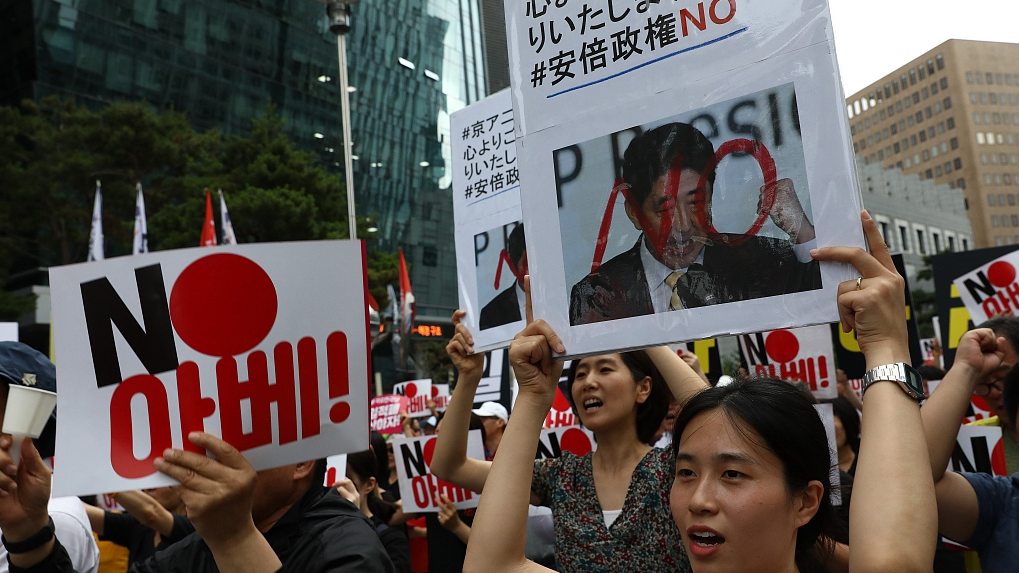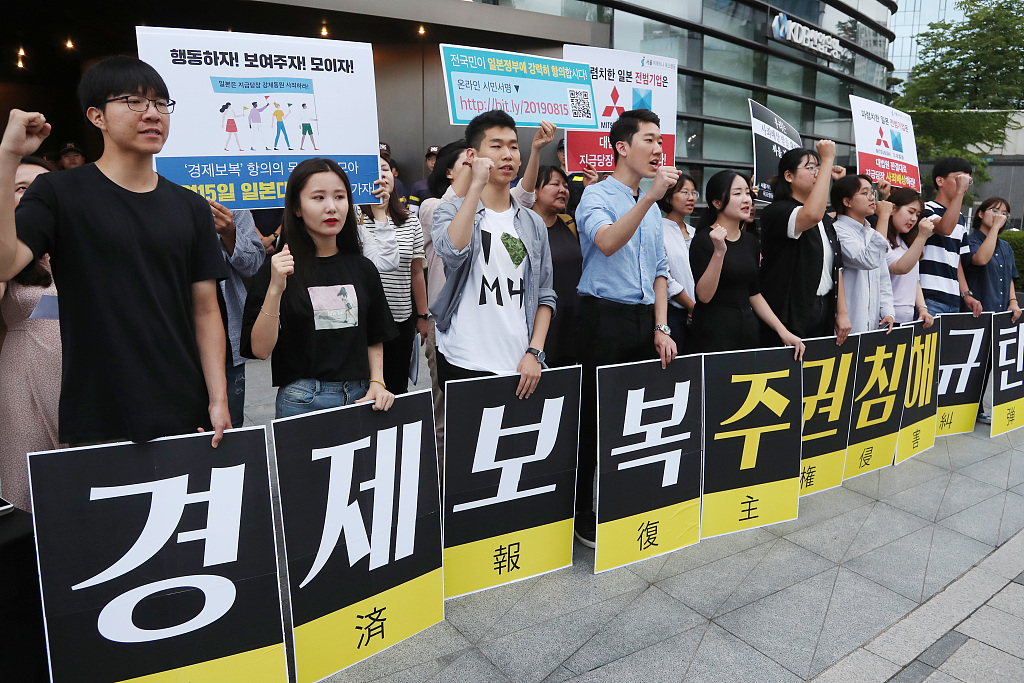

Editor's note: Chris Deacon is a postgraduate researcher in politics and international relations at the University of London and previously worked as an international commercial lawyer. The article reflects the author's opinion, and not necessarily the views of CGTN.
The ongoing trade dispute between Japan and the Republic of Korea (ROK) is only the latest episode in a continual worsening of relations between the two neighbors in the last year – and even that part of a much wider pattern in place for over a decade.
Ever-complicated by issues of history, Seoul and Tokyo consistently struggle to get along – much to the chagrin of their mutual ally, the United States. Is this pattern inevitable; or can Japan and the ROK move past their mutual animosities to forge a more positive and future-orientated relationship?
The current period of conflict between Seoul and Tokyo began late last year when a ROK court ruled that Korean victims of Japanese forced labor during World War Two and the period of Japanese colonization could claim compensation from private firms who benefited from this labor.
This move greatly angered the Japanese government, who have repeatedly claimed that this – and many other historical issues – were settled by the 1965 treaty between the two countries that normalized their relations. Successive ROK governments – particularly under progressive presidencies – have, however, never been comfortable abiding by a document negotiated and agreed by the authoritarian regime of Park Chung-hee that ruled the ROK at the time.
Other disputes have become embroiled in this quarrel over history and how that history should be dealt with in the present day. These have included an incident in December where a ROK Navy radar locked onto a Japanese aircraft, to the outrage of the Japanese government. The ROK claimed, however, that Japan’s behavior was threatening enough to justify this action.
While, most recently, a trade dispute has engulfed the two countries, as Japan has restricted certain imports from the ROK as well as promising to remove Seoul from a “white list” of trusted countries for certain exports – all highly disruptive moves for the ROK economy.
The connection between these issues is not abstract – members of the Japanese government have specifically cited Seoul’s behavior concerning the forced labor dispute as a factor in motivating Tokyo’s trade restrictions. As is seemingly ever the case with these two countries, history plays a part in virtually every disagreement, even if only in the background.

South Korean activists hold a rally in front of the Japanese Embassy in Seoul on July 11, 2019 denouncing Japan's tightened controls on exports of high-tech materials to South Korea. /VCG Photo
While Japan-ROK relations have gone through difficult periods in the past, the current disputes are almost certainly the most serious in the contemporary period. And the implications are not only relevant to Seoul and Tokyo themselves, but to the East Asian region as a whole and, particularly, to mutual allies such as the U.S.
The U.S. has a strong interest in high levels of cooperation between Japan and the ROK – in particular in relation to security and intelligence cooperation. As the superpower linking these “quasi-allies”, as the scholar Victor Cha described them, the U.S. has played a key role in attempting to facilitate warmer relations, but, while often enjoying short-term successes, has always ultimately come up short in the long term.
While the U.S. can play a role in facilitating an improvement in relations, ultimately, it will be up to Japan and the ROK themselves to forge a solid and permanent base from which they can move towards a future-looking, more positive partnership. The treatment of fractious history will be vital in this process.
As long as both countries continue to use history – and the memory of that history – as a tool for ulterior political motives, it will be impossible to create the kind of relationship necessary for cooperation. Administrations on both sides must be consistent about this. These are deeply sensitive issues, and even throw-away comments from a low-ranking official can ignite a spiral of recriminations on both sides.
But it is not only politicians who are vital in this process – better relations between the ROK and Japan will come as much from people-to-people relationships. In fact, polling suggests that negative sentiments regarding these issues is only hardening among younger generations, not lessening as we might expect.
Starting with the young is vital, therefore. Initiatives such as exchange agreements between high school and university students can produce generations of young people possessing heartfelt warmth regarding the other country and its people. These sentiments would be an important base from which to build a more cordial future.
The Korean and Japanese people share a great deal, in their culture, history and identity. Initiatives to improve relations in the past have resulted in genuine successes, and they can again – but it will take a genuine desire to build a better relationship. This starts with governments, but it will end with everyday people.
(If you want to contribute and have specific expertise, please contact us at opinions@cgtn.com)

Copyright © 2018 CGTN. Beijing ICP prepared NO.16065310-3
Copyright © 2018 CGTN. Beijing ICP prepared NO.16065310-3